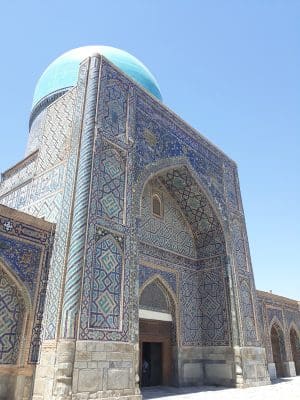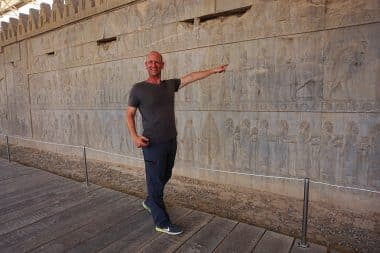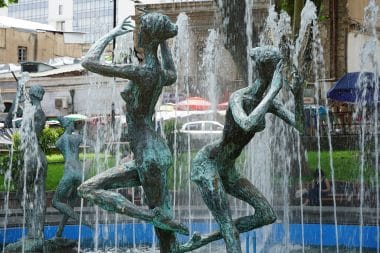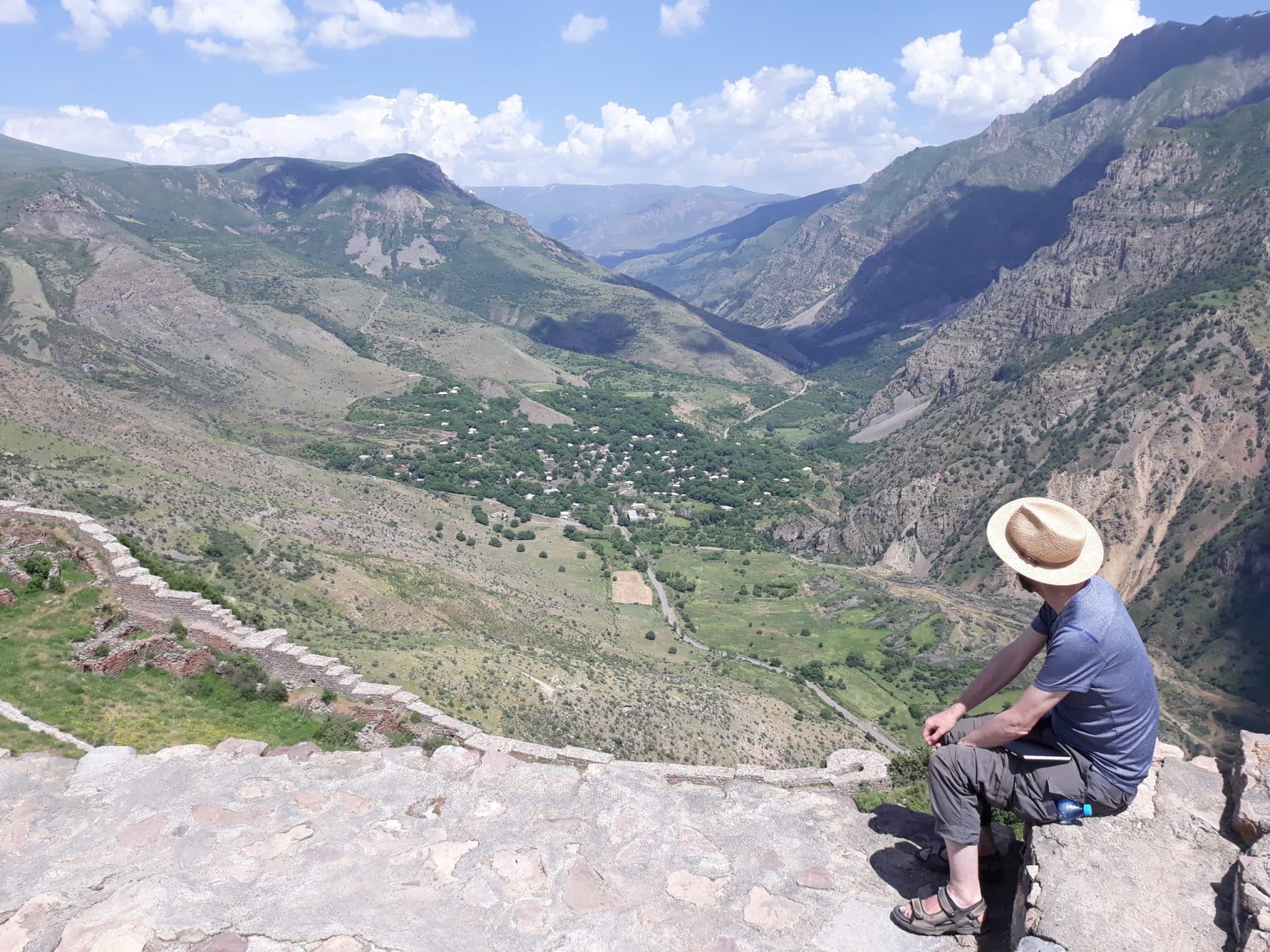While Europe stumbles from crisis to crisis, the countries of Central Asia are redefining themselves with China’s help. Travel book author Thomas Bauer tells of encounters in Tbilisi, Tehran and Samarkand.
by Thomas Bauer, travel book author (https://neugier-auf-die-welt.de/thomas-bauer)
“Everythingis Chinese!” says Adil, pointing to the four-lane road that connects the popular Lake Issykkul with Kyrgyzstan’s capital Bishkek. The journey used to take six hours, now only two and a half.
“All this is Chinese” is often heard when traveling between Eastern Europe and Central Asia – whether it’s roads and railway lines, nuclear power plants and dams, or toys and food.
While Europe is increasingly concerned with itself, a fundamental paradigm shift is taking place in a huge area that has received little attention in this country. It becomes more visible the closer you get to China .
New self-confidence from Istanbul to Tbilisi

“In the past, there was only one goal for us: Europe.” That’s what Hamza, who plays music on a party ship in Antalya , says. What he politely conceals from the German guest is that Europe is no longer a promise. Instead, the company is increasingly orienting itself towards the economically strong countries of the Arabian Peninsula and turning to Asia.
In the past, it was different: the whole country looked expectantly to the West; the economically weak eastern part of the country, Anatolia, was turned its back. In the meantime, however, the incomparable location between Orient and Occident is increasingly understood for what it is: a geostrategic trump card that opens up new perspectives.
Meanwhile, Hamza tries to impress a black-eyed dancer by turning up Okan & Volkan’s vows of love. “Halden Anlamaz”, it echoes across the sea – a hit created from Turkish folklore, Arabic influences and Western pop music.
Further east, in Armenia’s capital Yerevan, people do not speak well of Turkey . The latter still refuses to commemorate the victims of the massacres in the First World War appropriately. Armenia, which in 301 was the first country in the world to elevate Christianity to the state religion, has always been a bone of contention. For centuries, Romans and Persians fought over the fertile area. It once stretched from the Mediterranean to the Caspian Sea; today, the mountainous country offers a habitat for just three million people. Eight million Armenians live outside their country. Even the national symbol, Mount Ararat, where Noah’s ark is said to have stranded, is no longer in the country, but a few kilometers behind the border – in Turkey, of all places.

As soon as you leave the capital, you feel thrown back decades. Cows and goats cross pothole-strewn roads, “marshrutkas”, the Russian form of shared taxis, puff up dust-dry windings. Wherever you turn, your gaze quickly reaches a mountain that you can hardly get enough of – especially since a monastery that seems to have fallen out of time usually balances spectacularly on its abyss. Those who hold out here will be just as hard and frugal as the rock massifs that shape the landscape for a long time.
In the neighboring state of Georgia , on the other hand, they have managed to establish profitable tourism, which is kept alive with bus tours and bicycle excursions. The latest craze is a 240-meter-long glass bridge over the Dashbashi Gorge, with a diamond-shaped bar in the middle.
Especially in the villages, there is still genuine hospitality, which is expressed by feasting extensively with each other. The unsuspecting guest, who takes a seat at a long table for the first time, may think that the feast is over after an hour. After all, as a rule, people have not only eaten the starter – stuffed eggplant or a hearty soup – and a fish, but have also helped themselves unrestrainedly to the almost addictive cheese bread “Khachapuri”. Not to mention the wine, which the table master pours with a new toast with each course. But the fun is just beginning! Now the main course is served, shish kebab for example or mutton stew, in any case meat, with plenty of rice or potatoes and a few alibi vegetables. Of course, you drink wine with it again. Only when it comes to dessert do they hold back: some fruit and a coffee are enough – after all, the next feast begins in the early evening.
Mullahs, mosques and mosaics: on the road in Iran

What a friend and colleague had driven you crazy when you left for Iran! You would be kidnapped there, they said, robbed anyway, spat on by fanatics and imprisoned by the mullah regime.
None of this is true. Instead, you meet friendly people who are looking for conversation, but who lack the intrusiveness that is widespread in large parts of the Orient. Yet they have reasons to hate the “Western” guest: After all, the sanctions ensure that money slips between their fingers and they have to keep their heads above water with two or more jobs. For example, they may clean hotel rooms in the morning, then cut customers’ hair and spontaneously become taxi drivers and tour guides as soon as they see a foreign visitor.
Iran’s cities are spectacularly beautiful. Tehran is a modern city where women wear body-hugging clothes and men sing along to the hits of Eminem and The Weeknd. The buildings of Isfahan and the gardens of Shiraz overwhelm you from the very first moment. In between, however, you drive for hours through semi-deserts, wastelands. At just under 50 degrees, the last shrubs wither. In the dried-up riverbed of the Zayandeh, children play football.
Iran has a water problem. Lake Hagun is completely dry at times, Lake Urmia, ten times larger than Lake Constance, could follow in a few years. This is not only due to climate change, but also to the construction of dams and the excessive irrigation of agricultural land. Perhaps, it is said behind closed doors, that is why the government is agitating so exaggeratedly against Israel and the USA: to distract from its own inability to solve the country’s most important problem. Iran is dying of thirst.
The lovable rascals of Uzbekistan
“That’s 30,000 soms, after all, I took a detour!”
Rustam smiles innocently, but at the same time sits up in the driver’s seat of his taxi and looks around him demandingly – a mixture that probably only someone who has offered services for a long time can manage. Of course, he only drove longer because, contrary to his assurances, he had no idea where in Samarkand the hotel he was looking for was located. The sum corresponds to five times the normal price; Rustam also speculates that his co-driver may only have a 50,000-som note. Then he could regrettably raise his shoulders, claim that he unfortunately has no change and see if he can get away with it. On the other hand, its price is still significantly cheaper than what a taxi driver would charge in Germany . In this respect, it is ultimately a good deal for both sides.
Even though Tehran is the largest city on the Silk Roads, its heart clearly beats in the Uzbek oasis cities of Bukhara and Samarkand. Their names alone create images of magnificent mosques, bustling bazaars and lovable rascals. And all this is true! Especially the thing with the lovable rascals.
The buildings score with sophisticated statics, curves and domes. They lack the unimaginative angularity that has the upper hand in Europe. In addition, they are richly decorated with artistic, sometimes mysterious mosaics. Above all, however, they always have new varieties of blue. Despite all their undeniable presence, they therefore seem strangely light. Perhaps they even express a longing for the sea – no wonder in one of only two countries in the world that are “double landlocked”, i.e. neither themselves nor one of their neighboring countries have access to the sea (the other such country is Liechtenstein).
Despite all the enthusiasm, one should not forget that most of the buildings were built by slaves. After Tamerlane, also known as Timur Lenk or Amir Temur, became sole ruler in 1370, he began his cruel and successful campaigns of conquest. Master builders, craftsmen and artists of the defeated peoples were brought to Samarkand, where they had to build mosques and palaces in honor of the foreign ruler.
30 years after the collapse of the Soviet Union, Uzbekistan is aware of its own strength. In the semi-deserts, gold and oil are mined. The “Afrosiyob” electric train, equipped with Spanish high technology, takes you to all the country’s major cities in no time at all – at a ridiculous price and with a service that would make any Deutsche Bahn employee sink into the ground in shame. Uzbekistan has even managed to build up its own car industry. The tourist potential of the Ferghana Valley is only just being discovered.
This increases the chances that typical German idiosyncrasies will continue to meet an Asian-influenced mentality in the future: While people in Germany like to address things directly, the relevant statements in Uzbekistan take place between the lines. Did the “yes” sound enthusiastic or hesitant? People also like to ask if they are happy at the moment: “Are you happy?” Anything other than a “But of course!” would not only be met with complete incomprehension, but would also be an affront to the hosts. After all, you are offered a lot (even if you don’t want some of it). You can give feedback that you are satisfied. About every half hour.
The “brother” that can be heard everywhere, however, does not correspond to the jovial American “bro”. After all, it stems from a completely different image of the family: the family, like the neighbourhood (“mahalla”), offers orientation, but at the same time sets tight boundaries. You take advantage of opportunities and earn money, or marry and raise children. Individual life plans that go beyond this framework are not planned. This is another reason why Uzbek hospitality often slips into over-care. Above all this, however, lies a trust in God, a devotion with a tendency to fatalism, which, combined with the local aversion to haste and hecticness, can be quite suitable to increase the feeling of vacation.
An old trade network leads to a multipolar world
Some Silk Road myths persist in Europe. For example, that there is a Silk Road. This has always been a network of trade routes. The name “Silk Road” was first used in 1877 by the German geographer Ferdinand von Richthofen. On the trade routes, not only silk was transported, but also furs, carpets, porcelain, jade and rhubarb roots, a popular laxative. In return, horses, jewelry, garlic, frankincense and kohlrabi were purchased. Ideas and inventions made their way to Europe – including paper and banknotes, the spinning wheel, the compass and the stirrup.
Above all, however, the Silk Roads are by no means a thing of the past; They are alive and kicking. China is expanding it with incredible investments. For 2000 years, from 500 BC until the discovery of America and the shift of trade to sea routes, the Silk Roads formed the backbone of global trade. China wants to build on this and is now focusing on the “Digital Silk Road”, fiber optic cables, 5G coverage and mobile payment. The “China Standards 2035” research project aims to promote Chinese instead of “Western” standards.
“You used to be the masters of the world,” Adil says with un-Asian openness, while in front of us Lake Issykkul, framed by four-thousand-metre peaks, seems like a promise. In the meantime, we have been on the road together for a few days. “In the future, however, there will be more than just one center of power. And somehow that’s fairer than a world according to the will of the USA, isn’t it?”
The fact that Europe is not interested in Central Asia could soon come back to haunt it. While in this country people no longer seem to be able to think outside the box due to ever new crises, elsewhere the course for the future is being set. You don’t have to approve of the current developments. But you should take a look: The future of all of Central Asia depends on silken paths.


